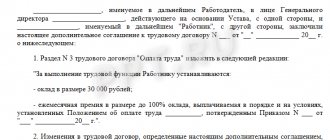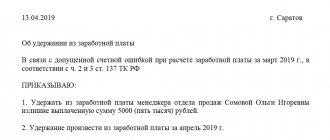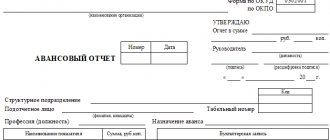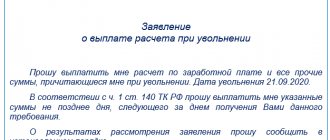Cases of deduction from wages
- to reimburse an unpaid advance issued to an employee on account of wages;
- to repay an unspent and not returned timely advance payment issued in connection with a business trip or transfer to another job in another area, as well as in other cases;
- to return amounts when the employee made accounting errors, in the event of recognition of the employee’s violations of labor legislation,
- upon dismissal of an employee before the end of the working year for which he has already received annual paid leave for unworked vacation days.
Deduction is not made if he resigns due to the fact that:
- the employee refuses to be transferred to another job (clause 8, part 1, article 77 of the Labor Code of the Russian Federation),
- the organization is being liquidated (clause 1, part 4, article 81 of the Labor Code of the Russian Federation),
- the number or staff of the organization’s employees is being reduced (clause 2, part 4, article 81 of the Labor Code of the Russian Federation),
- the owner of the organization’s property is being changed (company management) (clause 4, part 1, article 81 of the Labor Code of the Russian Federation),
- the employee is called up for military service (clause 1, part 1, article 83 of the Labor Code of the Russian Federation),
- the employee is reinstated at work by decision of the state labor inspectorate or court (clause 2, part 1, article 83 of the Labor Code of the Russian Federation),
- the employee was declared completely incompetent for work on the basis of a medical report (clause 5, part 1, article 83 of the Labor Code of the Russian Federation),
- the death of an employee or employer has occurred, or the court has declared him dead or missing (Clause 6, Part 1, Article 83 of the Labor Code of the Russian Federation),
- the occurrence of emergency circumstances that prevent the continuation of labor relations (clause 7, part 1, article 83 of the Labor Code of the Russian Federation).
Before issuing an order to deduct from an employee's salary, the employer must take into account all of the above points.
And also take into account the employee’s opinion, since deductions from wages are made only with the consent of the employee, and consent must be expressed in writing.
How to make an application
There is no single application form for salary deduction; the employee fills it out in a free format. Its content will largely depend on the purpose of the salary deduction, so the wording used here may vary.
But the general points that need to be reflected in the application will be:
- Recipient of the application : who it is addressed to - the name of the employing company and the full name of the director.
- Full name of the employee, his position, department (if necessary - personnel number and passport information).
- Name of the document “Application”.
- Please make a deduction from your salary indicating their type (for example, alimony, loan payment, etc.).
- Dates from which it is necessary to start making deductions.
- Deduction amount : specific monetary amount.
- Frequency of payment of deductions.
- Bank details by which it is necessary to transfer deductions (account number, name of the bank, its INN and KPP, correspondent account, BIC).
- List of attachments to the document (for example, a notarized agreement of the spouses to pay alimony).
- Employee signature and date of application.
Other information is included in the application depending on the specifics of the situation. For example, an employee may additionally provide consent to pay a fee for transferring funds or indicate the full name of the recipient of alimony and information about the children to whom alimony is paid. The application may include not a request to withhold, but an agreement to withhold a certain amount: for example, overpayments for vacation pay, the cost of work clothes or a work record book, etc.
When preparing an application, you need to take into account the internal rules of document management in the organization. The company can also develop a unified application form if many employees regularly make deductions from their salaries. For example, if a company issues microloans for employees, then a single application form can be developed to repay them.
Thus, the employee fills out an application for deduction from wages, if the deductions are not unconditional, or the debts are written off by court decision. Through such a statement, the employee consents to the employer to deduct from his salary.
This is interesting: How to apply to the court for alimony in 2021: sample, procedure, deadlines, document
Dear readers, each case is individual. If you want to find out how to solve your particular problem, call :
- Moscow .
- Saint Petersburg .
Or on the website. It's fast and free!
Conditions for deduction from an employee's salary
When deducting funds from wages, the employer must take into account two mandatory conditions:
- the monthly period established for the return of the advance, repayment of debt or incorrectly calculated payments has not expired;
- availability of the employee's written consent to deduct from wages.
Each of the above conditions must be met, but if one of the conditions is not met, then deduction from wages is possible only by court decision.
The amount of all deductions from wages cannot exceed 20% of the amount.
In some cases, established by federal laws, the withholding limit can be up to 50% of the payment.
For example, if there are several writs of execution, the deduction from the amount of wages cannot be 50% (Part 2 of Article 138 of the Labor Code of the Russian Federation).
This rule does not apply to deductions from wages:
- while serving correctional labor,
- when collecting alimony for minor children,
- when compensating for harm caused by an employee to the health of another person;
- when compensating for damage to persons who suffered damage due to the death of the breadwinner;
- when compensating for damage caused by a crime.
These cases of deduction from wages cannot exceed 70% of the amount of wages (Part 3 of Article 138 of the Labor Code of the Russian Federation).
In what cases is an application made?
Labor laws protect workers from illegal deductions that reduce their monthly income.
This article talks about typical ways to resolve the issue, but each case is unique. If you want to find out how to solve your particular problem, call :
- Moscow .
- Saint Petersburg .
Or on the website. It's fast and free!
Deductions from employees' wages are made in cases provided for by the Labor Code under Part 1 of Art. 137, as well as other federal laws.
Some amounts may be withheld from an employee's salary without his consent. This is, for example, personal income tax or deductions within the framework of writs of execution.
An application for deduction from wages from an employee is necessary if the employer has the following grounds:
- To pay off technical debt to employees due to overpayments , errors in calculations and other similar situations (based on Article 137 of the Labor Code).
- To compensate the employer for damages under Art. 248 of the Labor Code.
An application for deduction from salary will be required if the employee voluntarily decided to make deductions:
- In case of voluntary payment of alimony without a writ of execution (for example, on the basis of an alimony agreement).
- When transferring contributions to the trade union.
- When an employee participates in a voluntary pension insurance or health insurance program.
- When an employee pays a loan (consumer or mortgage).
- To pay for the services of mobile operators or utilities.
The specified list of grounds for deductions is not exhaustive; voluntary deductions can be of any kind.
An application for deduction from salary from an employee is not required:
- When writing off an unearned advance on the basis of Art. 137 Labor Code . It is worth considering that when an employee is dismissed, it is no longer possible to receive an unearned advance payment. But with the consent of the dismissed person, a refund can be issued and documented.
- When paying off damage under Art. 248 of the Labor Code , unless the parties have agreed on a separate procedure, and the amount of deduction does not exceed the employee’s average monthly earnings.
- When deductions are made on the basis of writs of execution.
- When withholding an overpayment that arose due to an unlawful action of an employee (based on a court decision).
Sample application
Let's look at sample statements for common reasons for deductions. Remember, such documents are drawn up in free form; the employer cannot refuse to accept them due to “incorrect execution.” However, try to reflect in the application the exact amount, reasons and deadlines so that fulfilling the request does not cause difficulties for the accounting department.
To withhold alimony
If the payment of alimony is ordered by the court, you do not need to write a statement. The employer will already transfer the required amount to the ex-spouse on a monthly basis. However, if we are talking about voluntary withholding of alimony, on your own initiative, use the following wording:
“I ask you to withhold monthly alimony from my salary in the amount of 40% from June 1, 2021 for the maintenance of my son Sergei Vitalievich Petrov. Please transfer the withheld amount simultaneously with the payment of wages to the bank account:
May 20, 2021, Vitaly Petrov.”
To retain credit loans
If an employee has debts to the bank and does not want to transfer money himself every month, it is permissible to entrust this responsibility to the employer. To do this, you should prepare the following statement:
For overpaid amounts
How to formalize the withholding of the overpaid amount? If the overpayment occurred due to a counting error and other circumstances specified in Article 137 of the Labor Code of the Russian Federation, the employer has the right to withhold funds without the employee’s application. In this case, the law allows him to deduct up to 20% of all charges. This can have a detrimental effect on the employee's personal budget. It would be better if the parties reach an amicable agreement and the employee indicates in the application what amount of deduction would be preferable.
“Due to a counting error and the payment of an extra 12 thousand rubles to me in wages for February and March 2021, I ask you to withhold 2,500 rubles from my salary every month until the debt is paid off. May 20, 2021, Petrov V.”
According to similar rules, the deduction of accountable amounts from wages is formalized: unearned advances, travel allowances, vacation pay.
In what cases is wages withheld?
Article 137 of the Labor Code of the Russian Federation gives employers the right to withhold part of the funds from an employee’s salary, but only in cases established by law.
This is interesting: Application for indexation of alimony: sample, drafting rules and submission procedure
There are 2 options for deductions: at the initiative of the employer and at the initiative of the employee. The employer's initiative is limited to the grounds specified in the Labor Code and federal laws. The percentages of contributions are strictly regulated. The employee has the right to voluntarily assign himself any deductions without restrictions on the amount.
Deductions at the initiative or debt of the employer:
- to reimburse unpaid advances, travel allowances and other overpaid amounts;
- to reimburse overpaid vacation pay if an employee quits in the year when he took vacation days in advance and did not work them;
- to reimburse over-accrued funds due to a counting error;
- according to court enforcement documents, for example, to pay alimony or debts to the bank.
The grounds on which an employer may not pay part of an employee’s salary are related to his financial obligations - to the employer, relatives and banks. The limit is limited by law: the employer cannot “recover” more than 20%.
Deductions initiated by the employee:
- to repay debts under loan agreements, credit, mortgages, alimony;
- for additional contributions to the pension fund (including non-state ones);
- for donation to charitable organizations.
The grounds for voluntary deductions are not limited in any way by law: the employee can indicate any reason and any amount up to 100% of wages.
Each month, the employer withholds 13% of the employee's salary as income tax.
Forced situations
Despite the fact that above we divided coercive situations into two points, they could be combined into one. It’s just that in the first case, the deduction is made on the basis of a court decision, and in the second, the employer automatically deducts a certain percentage of the salary either for financial responsibility, or based on the requirements of the Tax Code, or based on legal requirements. Let's look at the cases in which forced collection is carried out:
- Payments of personal income tax. This tax must be paid by all citizens who received income during the reporting period. The calculation and payment of personal income tax is regulated by Chapter 23 of the Tax Code. Thus, according to Article 226, the employer has the right to deduct from the salary only that part of the tax that the employee “earned” from him. If an employee works in two places, then personal income tax is deducted from the salary in both the first and second places in accordance with current legislation. Moreover, the amount of the deduction cannot be more than 50% of the salary paid in person, while the current rate in Russia is 13%.
- Deductions related to court decisions, which are carried out based on a writ of execution received by the enterprise. The presence of an executive decision is mandatory. Deductions under a writ of execution can be made for alimony for a child who has not yet become an adult, for the loss of a breadwinner, for compensation for a third party’s loss in connection with a crime, for a third party’s loss in connection with damage to health, etc.
- Deductions based on the requirements of the Family Code. Basically, they fall under Article 109, that is, alimony payments. The deduction is made after personal income tax is removed from the salary.
- To pay off existing debts to the penitentiary service. If an employee served a sentence under the Criminal Code, then in the future deductions may be made from him on the basis of a court decision or in the form of compensation for the amounts spent on maintaining the prisoner.
This is interesting: Statement of claim to change the procedure for collecting alimony: sample 2021








